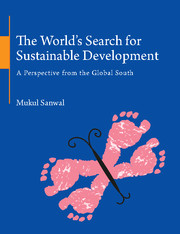Book contents
- Frontmatter
- Dedication
- Contents
- Preface
- Acknowledgments
- Abbreviations
- INTRODUCTION
- 1 Social Dimension of Sustainability
- CONSUMPTION IN AN UNEQUAL WORLD: FRAMING INTERNATIONAL COOPERATION
- CLIMATE POLICY: GLOBAL TO NATIONAL
- SUSTAINABLE DEVELOPMENT: NATIONAL TO GLOBAL
- CONSUMPTION IN A MORE EQUAL WORLD: SHAPING SOCIETAL FUNCTIONS
- GEOPOLITICS TO GEOECONOMICS: RURAL–URBAN DIVIDE, RATHER THAN BETWEEN COUNTRIES
- 21 Urban Areas: Sustainable Development and Human Well-being
- 22 Rural Areas: Climate Change, Fragile States and Human Security
- 23 Global Sustainable Development Goals
- 24 Transformative Impact of the Re-Emergence of China
- THE ASIAN CENTURY
- Index
24 - Transformative Impact of the Re-Emergence of China
from GEOPOLITICS TO GEOECONOMICS: RURAL–URBAN DIVIDE, RATHER THAN BETWEEN COUNTRIES
Published online by Cambridge University Press: 18 December 2015
- Frontmatter
- Dedication
- Contents
- Preface
- Acknowledgments
- Abbreviations
- INTRODUCTION
- 1 Social Dimension of Sustainability
- CONSUMPTION IN AN UNEQUAL WORLD: FRAMING INTERNATIONAL COOPERATION
- CLIMATE POLICY: GLOBAL TO NATIONAL
- SUSTAINABLE DEVELOPMENT: NATIONAL TO GLOBAL
- CONSUMPTION IN A MORE EQUAL WORLD: SHAPING SOCIETAL FUNCTIONS
- GEOPOLITICS TO GEOECONOMICS: RURAL–URBAN DIVIDE, RATHER THAN BETWEEN COUNTRIES
- 21 Urban Areas: Sustainable Development and Human Well-being
- 22 Rural Areas: Climate Change, Fragile States and Human Security
- 23 Global Sustainable Development Goals
- 24 Transformative Impact of the Re-Emergence of China
- THE ASIAN CENTURY
- Index
Summary
The transformative change over the last 40 years has been the re-emergence of China as the world's largest economy, leading to a reconsideration of the way we understand the world, global governance, the process of natural resource use and human well-being. In this period, China's economy has increased over 18 times, more than 680 million have been lifted out of poverty and the increase in its annual average per capita GDP from around $300 to $7000 has reshaped the world economy and geopolitics leading to the emergence of a multipolar world order. In 2015, China's outward foreign direct investment is likely to exceed its inward flows, powerfully symbolizing the degree to which China has matured as a global economic power. China has catalysed new financial institutions in Asia, where two-third of future global growth is going to take place, directly challenging the Bretton Woods institutions established by the United States after World War II. At the meeting of Asian and African nations in Jakarta to mark the 60th anniversary of a conference that made a developing-world stand against colonialism and led to the non-aligned movement, in April 2015, China called for “a new type of international relations” that leaves the “obsolete ideas” of Bretton Woods institutions in the past. The multilateral system has not been challenged but there is the call for new rules that are not based on universalism and recognize diversity and levels of development as essential elements of the architecture.
As the China–US Climate Agreement, signed in November 2014, demonstrates the initial emphasis is on a reframing of global environmental change, climate change and sustainable development because of the magnitude of energy, material and financial resources that will be needed for global well-being to converge around 2050. China's long-term goal is the realization of the ‘two centenary goals’ – doubling the 2010 GDP and per capita income of urban and rural residents and achieving the renewal of the nation by the 100th anniversary of the Communists gaining power in 2049, even as its carbon dioxide emissions peak by 2030. On March 5, 2015, Premier Li Keqiang announced the “Made in China 2025” strategy as a 10-year guideline to lay the foundation for the next two decades, to boost “innovation in China,” as an essential step for the country to achieve medium-high-level economic growth.
- Type
- Chapter
- Information
- The World's Search for Sustainable DevelopmentA Perspective from the Global South, pp. 285 - 302Publisher: Cambridge University PressPrint publication year: 2015

